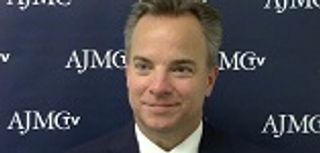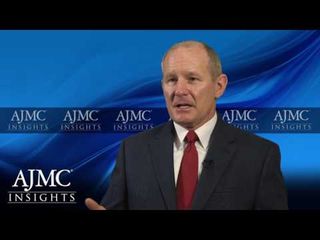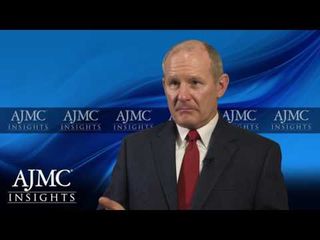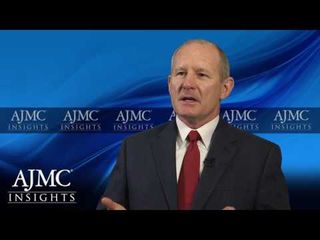
Insurance
Latest News
Latest Videos

CME Content
More News

This week, the top managed care news included the Nobel Prize in Medicine was awarded to 2 people for research into immunotherapy; physician-run accountable care organizations bring savings for Medicare; research highlights the health impacts of sexual harassment and assault.

The proposed CMS regulation to change the Medicare Shared Savings Program (MSSP) so that accountable care organizations (ACOs) take on risk faster creates a one-size-fits-all model that doesn’t allow for variability, said Joe Antos, PhD, the Wilson H. Taylor Resident Scholar in Health Care and Retirement Policy at the American Enterprise Institute.

The outpatient community oncology setting is consistently less costly for cancer treatment as opposed to the outpatient hospital setting.

Our study provides the first evidence on site-specific Medicare spending on chemotherapy adjusting for patient comorbid illnesses, cancer type, and other cancer-related risks.

Not only do physician-group accountable care organizations (ACOs) save Medicare more money than hospital-integrated ACOs, but the savings of physician ACOs grew substantially over 3 years.

Every week, The American Journal of Managed Care® recaps the top managed care news of the week, and you can now listen to it on our podcast, Managed Care Cast.

A profile of a program that calls for residents in a rural area to become full partners in managing their type 2 diabetes, and in the process bring changes to their community.

A former president of the American Association of Diabetes Educators addresses the need to remodel diabetes self-management education and support, to create a reimbursement system that better meets the needs of today's providers and patients.

Aetna is selling its Medicare Part D prescription drug unit to WellCare Health Plans; Seema Verma, administrator of CMS, defended Medicaid work requirements, saying they are not intended to kick people out of the program; an experimental tuberculosis (TB) vaccine demonstrated 54% protection in a clinical trial.

This week, the top managed care news included comments to several proposals from CMS; Medicare advocates say voters will be motivated by healthcare cost concerns during the midterm elections; research showed diabetes drug dapagliflozin, an SGLT2 inhibitor, reduces risks of major cardiovascular events.

The in-home visit gives the pharmacist a unique perspective on the medication experience of the member, allowing them to compare discharge information and Part D claims information to the medications present in the home, as well as assess adherence and discover discrepancies by having the member walk them through when and how they take their medications each day.

Readmission rates for Medicare patients with 6 major diseases were statistically higher among for-profit hospitals compared with nonprofit or government hospitals, according to a new study.

This instrumental variables analysis estimates that Medicare would realize $362 million in annual savings if all patients with newly diagnosed low back pain were managed conservatively.

Advocates for keeping Medicare as it is were joined by a well-known pollster to discuss that voters are concerned about out-of-pocket costs, including what they pay for prescription drugs, as the 2018 midterm elections approach.

Medicare will ease up on annual readmission penalties for safety-net hospitals; the House of Representatives has passed a bill prohibiting pharmacy gag clauses, sending the bill to President Donald Trump's desk; the Creating and Restoring Equal Access to Equivalent Samples (CREATES) Act of 2018 would reduce federal spending on prescription drugs by $3.3 billion from 2019 to 2028.

Community Oncology Alliance (COA) submitted formal comments to CMS in support of proposed changes to the 340B Drug Discount Program and site-neutral paymnts put forward in the Hospital Outpatient Prospective Payment (HOPPS) rule. However, they also submitted comments warning against proposals to introduce new third-party middlemen to the Part B system.

CMS’ proposed rule described strong financial results from low-revenue ACOs, as well as ACOs in risk-bearing tracks, but it mostly ignored the success of small, rural providers in ACOs.

Heart failure hospitalization has been a target for accountable care organizations seeking to find ways to cut costs from the healthcare system. But it remains to be seen how many of the estimated 2 million patients would gain access to the device if it received an expanded indication and payer coverage.

AARP and other groups reacted strongly to reports that the pharmaceutical industry was using efforts to combat the opioid crisis to roll back an agreement to close the coverage gap in Medicare Part D.

Coverage of our peer-reviewed research and news reporting in the healthcare and mainstream press.

CMS' Medicare Shared Savings Program proposal would make substantial changes to the benchmarking methodology for accountable care organizations.

Every week, The American Journal of Managed Care® recaps the top managed care news of the week, and you can now listen to it on our podcast, Managed Care Cast.

Research has shown nonemergency medical transportation can be essential for patients in rural areas, as well as the poor, elderly, and chronically ill. In a Health Affairs blog post, authors from CareMore Health show how the company has found success with Lyft after a pilot program it ran in 2016.

This week, the top managed care news included medical groups asking CMS to halt or slow down its plans to cut physician reimbursement for evaluation and management services; the Senate weighs a package of bills to combat the opioid epidemic; new research shows the Affordable Care Act pushed the uninsured rate down to 10%.

Not only do pharmacy benefit managers profit thousands of percent using spread pricing, but the spreads are growing; support for Medicare for all is growing among Democrats in Congress, but it's still unclear how such a drastic chage would impact the complex American healthcare system; while precision medicine has great potential, it still has far more failures than successes, but that isn't usually discussed.


















